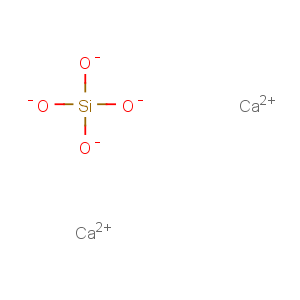Title: Calcium Silicate
CAS Registry Number: 1344-95-2
Literature References: Many different forms of calcium silicate are known. Among the most common forms are CaSiO3, Ca2SiO4 and Ca3SiO5. Usually occur in hydrated form contg various percentages of water of crystallization. Names of calcium silicate minerals are:
afwillite;
akermanite;
calcium pectolith;
centrallasite;
crestmoreite;
eaklite;
foshagite;
foshallasite;
gjellebaekite;
grammite;
gyrolite;
hillebrandite;
larnite;
okenite;
parawollastonite;
pseudo-wollastonite;
riversideite;
table spate;
tobermorite;
wollastonite;
xonaltite;
xonotlite. Commercial calcium silicate sold for industrial use, such as
Micro-Cell and
Silene, is prepared synthetically to control its absorbing power. The usual method of prepn is from lime and diatomaceous earth under carefully controlled conditions: Boss,
Chem. Eng. News 27, 677 (1949); Steinour,
Chem. Rev. 40, 391 (1947). The commercial product is described here.
Properties: White or slightly cream-colored, free-flowing powder. Approximate analysis: CaO 19%, SiO2 67%, H2O 6 to 8%. d25 2.10. Bulk density: 15-16 lb/cu ft. Absorbs 1 to 2.5 times its weight of liquids and still remains a free-flowing powder. Total absorption power for water about 600%, for mineral oil about 500%. Available surface area: 95 to 175 m2/g. Ultimate particle size: 0.02 to 0.07 m. pH of aq slurry 8.0 to 10.0. Practically insol in water. Forms a siliceous gel with mineral acids.
Density: d25 2.10; Bulk density: 15-16 lb/cu ft
CAUTION: Potential symptoms of overexposure are irritation of eyes, skin, upper respiratory system.
See NIOSH Pocket Guide to Chemical Hazards (DHHS/NIOSH 97-140, 1997) p 48.
Use: Constituent (produced
in situ) of lime glass, portland cement; reinforcing filler in elastomers and plastics; absorbent for liquids, gases, vapors; as anti-caking agent, suspension agent, pigment and pigment extender; binder for refractory material; in chromatography; in road construction.

